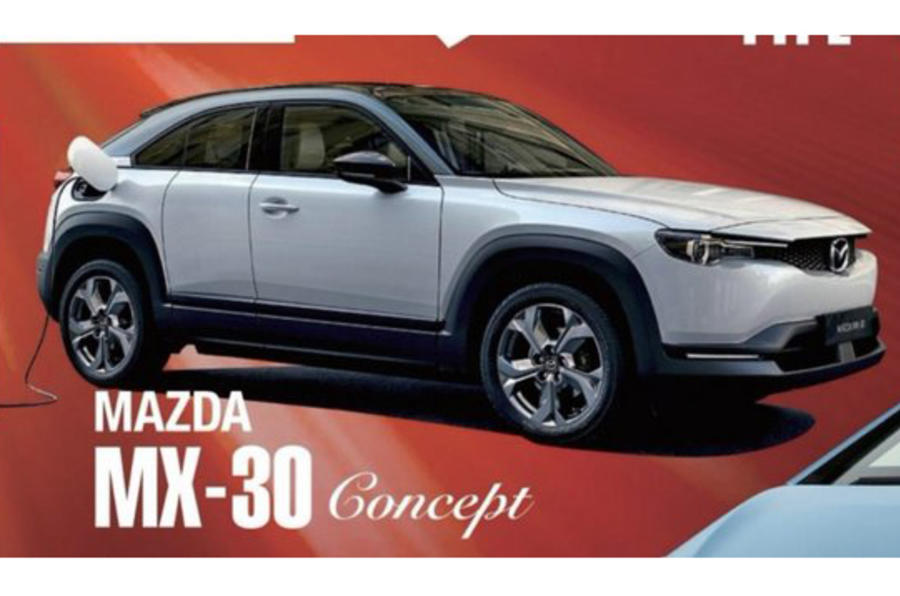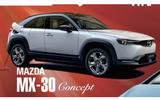Images and details of Mazda’s first electric vehicle have leaked in the Japanese media today ahead of its official reveal at Tokyo motor show tomorrow.
The image, which reveals the zero-emissions model will be called MX-30, was published alongside power figures, which match those of the e-TPV prototype we drove recently. It has a 35.5kWh battery and a single electric motor delivering 138bhp and 195lb ft of torque to the the front wheels via a single-speed transmission.
The Mazda MX-30 concept has been officially revealed - read the full story here
Mazda's last communication on the upcoming model was last week when it said the car develops the design language first seen on the recently launched Mazda3 to reflect “futuristic values and changing lifestyles”.
The model, which will go on sale next year, has a coupe-like cabin and “achieves a lightweight look by adopting a unique door concept”. Mazda added that the front face bears a “friendly expression”.
The interior is said to use empty spaces around the centre console to create a closeness between the driver and passenger seats. Mazda added that interior materials were chosen for comfort and “eco-friendliness”, both of which are intended to make the cabin comfortable.
The model, as shown in this leaked image, adopts an SUV bodystyle, which can more easily accommodate an underfloor battery pack.
The EV is likely to have a range between 120 and 150 miles, similar to the new Mini Electric but significantly less than more obvious rivals, such as the 279-mile Hyundai Kona Electric. It will be able to accept 6.6kW domestic charging and 50kW public rapid charging.
Mazda will also introduce a modern version of its famed rotary engine in a range-extender variant of the EV. Two years ago, Mazda boss Mitsuo Hitomi confirmed that, rather than being used in its purest form, a rotary engine will be used as an EV range-extender. He said: “The rotary engine isn’t particularly efficient to use as a range-extender, but when we turn on a rotary, it's much, much quieter compared to other manufacturers’ range-extenders”.
The Japanese firm’s range hasn’t featured a rotary-engined road car since the RX-8 went out of production in 2012, but it did produce a rotary range-extender Mazda 2 prototype – which Autocar drove – back in 2013. It has remained interested in reintroducing the technology to production since. The Mazda RX-Vision Concept, which was shown at the Tokyo motor show in 2015, used such a powertrain.










Join the debate
Add your comment
"achieves a lightweight look.
"achieves a lightweight look..."
It can't be a development of the 3's design language, the 3 is a very heavy looking vehicle.
Range isn't everything
OK I accept that given this country's current poor charging infrastructure EV range is an important consideration for many buyers. But remember that it comes at a price: more range inevitably means more cost, more weight and more space taken up by batteries (a lot more in these instances).
Bearing in mind that as the charging network and speed improve - and considering that few of us want or need to drive more than 150 miles at a stretch - it's possible that Mazda and Honda may have made good decisions with their short-range EVs.
Maybe the smart move would be to wait until such time as smaller, lighter, cheaper batteries are available before being too ambitious with range? Not all of us want to drive around in two tonne Teslas just so that we can go for the occasional long drive!
You don't have 2
Model 3 starting weight is 1640kg not 2030kg.
Range hangups
You're right, I think there is a big hangup about range; we all think of the rare long drive when 99% of the time daily mileage is well under 100 (except for sales reps and the like). Although BMW ditched the range extender on its i3, it has been suggested that that is indeed the best way forward: smaller batteries with a compact range extender which could eventually run on some synthetic sustainable fuel.
Mixed Feelings
As a Mazda fanboy, I'm really looking forward to their late entry to the BEV market. Although I understand their reasons by the somewhat uncompetitive range; predominantly urban use, lower CO2 output through the whole life of the car, from manufacture to end of life, I'm not sure your average buyer will consider those factors and will focus mainly on the range offered at the expected price point and sector this car is likely to sell at. I'm sure it will look fantastic inside and out, but will that be enough to tempt sufficient numbers of buyers?